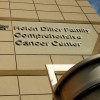
|
UCSF has a long and continuing history of excellence in cancer research and care. The tradition of cancer-related research at UCSF owes much to the vision of David A. Wood, MD, who in 1948 was appointed as the first director of the UCSF Cancer Research Institute. Wood felt that the key to curing cancer is “the multidisciplinary approach, both clinical and basic scientists working together.” That philosophy is still the core of UCSF’s efforts. Seminal contributions in cancer research at UCSF include, notably, the work of Drs. J. Michael Bishop and Harold Varmus, who were awarded the 1989 Nobel Prize in Medicine for their discovery of oncogenes, and Dr. Elizabeth Blackburn, who was awarded the Nobel Prize in 2009 for her groundbreaking work on the molecular nature of telomeres. The Cancer Center achieved status in December 1999 as an NCI-designated “comprehensive cancer center,” the highest of three designations. NCI-designated cancer centers are characterized by scientific excellence and their ability to integrate a diversity of research approaches to focus on the problem of cancer. In addition to undertaking novel laboratory-based and clinical research, as well as maintaining excellent clinical care programs, comprehensive cancer centers must integrate cancer prevention, control, and population sciences. Through these combined activities, comprehensive cancer centers play an important role in their communities and regions and serve to influence standards of cancer prevention. In November 2007, the Center was renamed the UCSF Helen Diller Family Comprehensive Cancer Center in tribute to Bay Area resident Helen Diller and her family’s trust in UCSF’s ability to rapidly translate cancer discoveries into compassionate care. For more information click here |
Awareness • Early Detection • Treatment • Research • Survivorship
